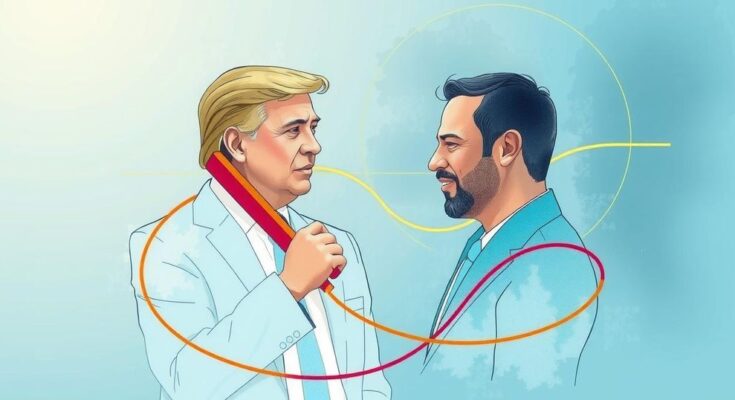U.S. President Donald Trump and Russian President Vladimir Putin engaged in a lengthy phone call discussing a range of issues including the situation in Ukraine, attempts to mend U.S.-Russian relations, peace efforts in the Middle East, and global security. The conversation revealed attempts at de-escalating military conflicts while highlighting concerns for Ukraine’s sovereignty amid sidelined negotiations.
In a significant two-hour phone conversation, U.S. President Donald Trump and Russian President Vladimir Putin addressed the ongoing conflict in Ukraine and explored ways to improve U.S.-Russia relations. The leaders discussed various global issues, including peace in the Middle East and global security. The call, characterized as the longest between the two leaders in years, provided Putin an opportunity to move the narrative away from Ukraine and elevate the perspective on international cooperation.
The dialogue underscored both presidents’ intentions to mend increasingly strained ties amid the protracted conflict in Ukraine, which has reached its lowest diplomatic point since the Cold War. The Kremlin, along with Russian state media, expressed approval for what they labeled as the initiation of a more equitable dialogue between the two nuclear superpowers.
Despite the emphasis on peace, the reality of a ceasefire in Ukraine remains precarious. During the call, Putin demonstrated a willingness to pause strikes on energy infrastructure while concurrently setting conditions that complicate prospects for a truce, such as linking it to the cessation of Western arms supplies. In contrast, Ukraine remains resistant to any stipulation that appears to erode its sovereignty or military capacity.
The conversation also revealed shifting military dynamics in Ukraine, with Putin asserting that Ukrainian forces in the Kursk region were surrounded, a claim met with denial by Kyiv. Moreover, tensions continue to escalate as Ukraine fears potential Russian offensives in neighboring regions.
Through the discussion, Putin attempted to expand the conversation from a ceasefire to broader global issues, catching Trump’s interest in potential economic and geopolitical stability—postulating a future marked by enhanced U.S.-Russia relations. U.S. envoy Steve Witkoff expressed optimism regarding steps toward peace, portraying a hopeful dialogue between the nations.
Kremlin spokesman Dmitry Peskov reiterated that understanding between the two leaders is paramount for normalizing relations, with state media portraying this call as beneficial for cooperation. Analysts have suggested that this could represent a diplomatic win for Putin, essentially detaching bilateral relations from the ongoing conflict in Ukraine.
Ukrainian President Volodymyr Zelenskyy responded critically, warning that negotiations lacking Ukrainian input would be counterproductive. Following the Trump-Putin call, Zelenskyy had a conversation with Trump, emphasizing the necessity of aligning both Russia and Ukraine’s interests. Analysts have noted the troubling trend of sidelining Ukraine in discussions concerning its fate, which raises alarms regarding its future sovereignty and political representation within broader geopolitical negotiations.
The implications of this dialogue resonate through European corridors as well, with critics fearing a regression in support for Ukraine. The frequency with which the fate of Ukraine is being discussed with limited involvement from its leadership has provoked concerns over the fundamental reshaping of diplomatic strategies in the region.
The recent phone call between Presidents Trump and Putin has underscored the complexities surrounding the conflict in Ukraine and the broader context of U.S.-Russia relations. As both leaders seek to navigate these turbulent waters, critical issues such as potential ceasefires and shifting military dynamics remain unresolved. Additionally, the sidelining of Ukraine in talks raises significant concerns about its sovereignty and the future of European security. This development signifies a vital juncture in international diplomacy that warrants further scrutiny.
Original Source: www.pbs.org




